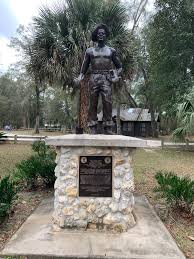By Nathan Crabbe, Gainesville Sun Opinion Editor
A statue of a young worker at O’Leno State Park near High Springs reminds visitors that participants in a New Deal program were responsible for first clearing land, building trails and constructing cabins there.
The Civilian Conservation Corps put nearly 3 million young men to work on environmental projects across the county during the high unemployment of the Great Depression. The CCC was responsible for building Florida’s first eight state parks, including O’Leno, and hundreds of other conservation projects in the state from 1933 to 1942.

As the plaque on the O’Leno statue says, the CCC “combined two great natural resources — youth and land — in a program designed by President Franklin D. Roosevelt to save both. It succeeded.”
Today, elected officials are proposing to revive the CCC as the country again confronts environmental challenges at the same time many young people are struggling to find work. The idea holds the promise of creating a new way for young Americans to work together in common purpose for the country, while also training them in needed jobs.
Last month, President Joe Biden issued an executive order directing federal agencies to develop a “Civilian Climate Corps Initiative.” The initiative is intended to mobilize the next generation of workers “to conserve and restore public lands and waters, bolster community resilience, increase reforestation, increase carbon sequestration in the agricultural sector, protect biodiversity, improve access to recreation, and address the changing climate.”
Plans for a new CCC have been tossed around for years. States around the country created their own conservation corps programs after World War II. President Bill Clinton signed into law in 1993 the creation of the AmeriCorps National Civilian Community Corps program, allowing 18- to 24-year-olds to work on a variety of service projects over a 10-month period after which they earn an education stipend.

I took part in AmeriCorps NCCC as a young man, working on projects such as building trails and restoring cabins where the original CCC worked in Maine. It sold me on the value of national service, especially the modern version that brings together diverse people in a way that broadens their understanding of the country while allowing them to give back and earn money for college.
Much work needs to be done preparing the country for the effects of climate change, from wildfires in the West to more intense hurricanes hitting Florida. Another proposal — in legislation filed by Sen. Ron Wyden of Oregon and Rep. Joe Neguse of Colorado — would create a “21st Century Civilian Conservation Corps” focused on work needed on western lands such as wildfire prevention and preparedness.
Our country should be working to prevent the worst consequences of climate change while also making communities more resilient to the problems we can’t prevent. A new CCC would help achieve those goals and create an impact like the one made by Depression-era workers responsible for parks we still enjoy today.
Nathan Crabbe (nathan.crabbe@gvillesun.com) is The Sun’s opinion and engagement editor.
“The Invading Sea” is the opinion arm of the Florida Climate Reporting Network, a collaborative of news organizations across the state focusing on the threats posed by the warming climate.



